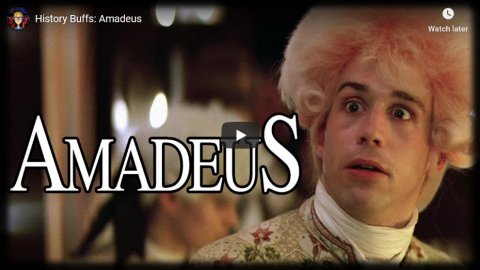Overly Sarcastic Productions
Published 24 Apr 2020“The Bard” is not only an essential class in any D&D party, but a byword for England’s most famous writer. We’ve covered a bit of Shakespeare before on OSP — just a bit, really, nothing major, only a dozen — but today we’ll look at how William got to Bard-ing, and how he accidentally became England’s biggest Historian.
SOURCES and Further Reading: The Introduction and play-texts of the Folger Shakespeare Library (The best way to read Shakespeare), “Shakespeare: A Very Short Introduction” by Wells
This video was edited by Sophia Ricciardi AKA “Indigo”. https://www.sophiakricci.com/
Our content is intended for teenage audiences and up.PATREON: https://www.Patreon.com/OSP
DISCORD: https://discord.gg/h3AqJPe
MERCH LINKS: https://www.redbubble.com/people/OSPY…
OUR WEBSITE: https://www.OverlySarcasticProductions.com
Find us on Twitter https://www.Twitter.com/OSPYouTube
Find us on Reddit https://www.Reddit.com/r/OSP/
April 25, 2020
History-Makers: Shakespeare
April 22, 2020
QotD: Actors
Why waste a whole evening, once or twice a week, in a stuffy and over-red theater, breathing zymotic air, sniffing discordant perfumery, looking at idiotic scenery, listening to the bleeding English of ignorant and preposterous actors? Have you ever, in all your life, seen five leading men who actually looked like civilized gentlemen, or even like the authentic valets, head clerks or unburied corpses of civilized gentlemen? Have you ever sat through a whole performance without wishing it were possible to take at least one of the actors out into the alley, there to do execution of the lex non scripta upon him? Eheu, Postume, what all of us have suffered at the hands of such strutting mummers and mountebanks! How we have writhed and squirmed beneath their astounding outrages upon the vulgate! What is worse than an actor? Two actors? Three actors? A whole stage full of actors! An endless succession of actors! … How we have leaped and squealed under their broad a‘s, their fearful renderings of proper names, their obscene attempts at boarding school French! How our paws have itched to grab them by the collars of their advanced coats, and to strangle them with their futurist shirts, and to anatomize them with the razor edges of their superbly ironed pantaloons! …
There are, of course, such things as good actors. Let us be just and admit it. I have seen and known a few myself, and have heard of a few more. There are half a dozen in England and as many in France. In Germany, I dare say, the police have the names of twenty. (One memorable night, in that strange land, I saw two on the stage at once!) But is the good actor, either at home or abroad, the normal actor, the average actor? Of course he is not. He is the rare actor, the miraculous actor, almost the fabulous actor. Examine a hundred bartenders and you will find that fully sixty of them actually know how to tend bar: they can mix a cocktail that, whatever its faults, is at least fit to drink, and they have the craft needed to draw a Seidel of Pilsner and to beat the cash register. But in the allied art of acting there is no such general dispersion of talent. A handful of outstanding super-actors have it all. The rest of them not only don’t know how to act, but they don’t know that they don’t know.
H.L. Mencken, “Getting Rid of the Actor”, The Smart Set, 1913-09.
January 15, 2020
History Buffs: Amadeus
History Buffs
Published 3 Dec 2015In this episode we look at the original Rock n Roll bad boy, Wolfgang Amadeus Mozart! And who says this show isn’t classy and sophisticated 🙂
● Follow us on Twitter: https://twitter.com/HistoryBuffs_
_________________________________________________________________________
Amadeus is a 1984 American period drama film directed by Miloš Forman, written by Peter Shaffer, and adapted from Shaffer’s stage play Amadeus (1979). The story is set in Vienna, Austria, during the latter half of the 18th century.
The film was nominated for 53 awards and received 40, including eight Academy Awards (including Best Picture), four BAFTA Awards, four Golden Globes, and a Directors Guild of America (DGA) award. In 1998, the American Film Institute ranked Amadeus 53rd on its 100 Years… 100 Movies list.
The story begins in 1823 as the elderly Antonio Salieri (F. Murray Abraham) attempts suicide by slitting his throat while loudly begging forgiveness for having killed Wolfgang Amadeus Mozart (Tom Hulce) in 1791. Placed in a lunatic asylum for the act, Salieri is visited by Father Vogler (Richard Frank), a young priest who seeks to hear his confession. Salieri is sullen and uninterested but eventually warms to the priest and launches into a long “confession” about his relationship with Mozart.
November 15, 2019
Shakespeare Summarized: Romeo And Juliet
Overly Sarcastic Productions
27 April 2014Yeah, sorry. I don’t like this play very much. I know it’s a classic, I know it inspired countless other love stories… I… I can’t help it. It’s just too funny. I’m sorry if you actually thought this play was tragic, because I did not respect your opinion here at ALL.
November 8, 2019
Shakespeare Summarized: Macbeth
Overly Sarcastic Productions
Published 12 April 2014Here it is! The Scottish Play. The bloodiest of the bloody. An epic tale of magic, madness and stabbing. It’s so gory, even Tarantino thinks it’s over the top.
Making it funny was pretty tough. 😀
October 30, 2019
Shakespeare Summarized: Julius Caesar
Overly Sarcastic Productions
Published 1 Dec 2013Here we go again! It’s only taken me several months…
Sarcastified Shakespeare returns, this time with a look at that historical tragedy we all love to write essays about, Julius Caesar!
I think the real main character here was Brutus’s crippling self-esteem issues…
October 22, 2019
Shakespeare Summarized: Hamlet
Overly Sarcastic Productions
Published 13 April 2013Well, this one is longer than the last one, but in fairness it’s 2000% shorter than the actual movie.
Continuing the trend, this video summarizes THE TRAGEDIE OF HAMLET PRINCE OF DENMARK, commonly known as Hamlet.
Goodness, he really is a whiner, isn’t he? And he’s supposed to be the sympathetic character!
Note: This is the second version of Hamlet Summarized, because I made the mistake of using a copyrighted song in the last one. Oops.
April 18, 2019
Shakespeare’s work is merely used to highlight the brilliance and originality of modern theatrical directors
Anthony Daniels reports for Quadrant Online of how he recently attended a performance of a play by some unimportant dead English white guy:
The precise date of the discovery by theatre directors that they are greater than Shakespeare cannot be specified: the discovery was more a process than an event. But by the time I saw a production of Richard II at the Almeida Theatre a few weeks ago, the superior genius of any director over that of Shakespeare was an established principle and indisputable fact.
[…]
But if I had an elevated conception of Shakespeare, how naive and mistaken I was! I knew nothing of Richard II — the play, that is, not the king — until I saw the production by Joe Hill-Gibbins. How narrow had been my previous conception of it! I discovered, among other things, that Richard was a short, fat fifty-eight-year-old in a black T-shirt, with a crown of the kind that is awarded to the person who finds the fève in the galette des rois that the French eat on the sixth of January, that the Duke of Norfolk was a woman dressed like a cleaning lady, and that all the action of the play takes place in what looks like a large biscuit tin, without exit or entrance. All this, of course, means something far deeper than anything that a mere Shakespeare could convey, being deeply symbolic, and therefore required real inventive genius on the part of the director to bring forth.
While the same actress took the parts of the Duke of Norfolk, Bushy and Green (all of them looking like cleaning ladies and each indistinguishable from the other because they could not leave the stage even to change costume), and the parts of both the Earl of Northumberland and the Bishop of Carlisle by other actresses, actual women’s roles such as that of Richard’s Queen were expunged entirely from the text. Between them, three actresses played five male parts and only one female. There is a profound lesson in this somewhere, no doubt in enlightened gender fluidity.
Most of the lines were delivered as if they were a religious incantation in a dead language that both the celebrants and the congregation desired to get over with as quickly as possible, clear diction being one of the many tools by which class hegemony is so unjustly exercised. The actor who took the part of Richard, it is true, was comprehensible, but made the acting of Sir Henry Irving appear taciturn by comparison. If emphasis is good, overemphasis must be better: no more stiff upper lip, we are all hysterics now, and can understand nothing that is not accompanied by gesticulation.
The director fortunately realised that Shakespeare got the order of his play wrong: Richard’s great speech in Act V scene 5 (“I have been studying how I may compare / This prison unto the world …”) was actually a prologue. The director is not the interpreter of Shakespeare, but rather Shakespeare is, and ought to be, the occasion, the opportunity, for the director to place his own immortal (and highly original) genius before the world.
October 16, 2018
Julie d’Aubigny – Duelist, Singer, Radical – Extra History
Extra Credits
Published on 13 Oct 2018Julie d’Aubigny lived during an unusual time in 17th-century France when political and cultural norms were shifting. She was allowed to exist openly as a bisexual woman pursuing her swordsmanship and singing talents in the court of King Louis XIV.
Join us on Patreon! http://bit.ly/EHPatreon
October 1, 2018
Kingdom of Majapahit – The Golden Reign – Extra History – #4
Extra Credits
Published on 29 Sep 2018The new sixteen-year-old king, Hayam Wuruk, had inherited an empire. Gajah Mada acted on his behalf, reshaping the way that the throne of Majapahit would be run, but he made a big mistake with the Sundanese princess…
Support us on Patreon! http://bit.ly/EHPatreon
August 22, 2018
July 16, 2018
Dublin theatres get a bit more egalitarian
Theodore Dalrymple on how the recent decision by the major theatres in Dublin to actively ensure that women are properly represented in the plays they put on:

The exterior of the Abbey Theatre in Dublin, also known as the National Theatre of Ireland (Irish: Amharclann Náisiúnta na hÉireann)
Photo by Flickr user bjaglin via Wikimedia Commons.
Henceforth, apparently, the major theaters of Dublin are, as a matter of principle, to commission at least half their new plays from women. At least half of the characters in the plays, and the directors too, will be women. One can only applaud this commitment to equality and social inclusion.
However, without wanting to carp, it seems to me that the gesture does not go nearly far enough. What about the fat, for example? As we know, a high proportion of the population is now fat, and quite a number are grossly obese. Yet how often do you see plays written by the fat, acted by the fat, directed by the fat, and of interest to the fat? The theatrical professions as a whole are pervaded by slim-ism, but there is no intrinsic connection between being slim and literary or acting ability. There is abundant evidence of widespread prejudice against the fat, and it is surely time that this was overcome. My own view is that at least 10 percent of playwrights, actors, and directors ought to suffer from type 2 diabetes.
And then, of course, there is the matter of intelligence. The average IQ of the population is 100, and such is the normal distribution of intelligence that there are as many people of below-average intelligence as above it. Yet how often do you see a play written or directed by those with an IQ of, say, 80? It is true that a play may appear to have been written or directed by someone with an IQ of 80 or below, but in this case appearances are deceptive. A high IQ is perfectly compatible with all kinds of foolishness or worse, after all; but this does not affect the basic argument from social justice. It is about time that people of low IQ be given their chance in the theater.
April 26, 2018
QotD: Drama critics
Nobody loves them, and rightly, for they are creatures of the night. Has anybody ever seen a dramatic critic in the daytime? I doubt it. They come out after dark, and we know how we feel about things that come out after dark. Up to no good, we say to ourselves.
P.G. Wodehouse, Over Seventy: An Autobiography with Digressions, 1956.
January 31, 2018
Don’t mention Macbeth – Blackadder – BBC
BBCWorldwide
Published on 24 May 2010The palace entertains two distinguished and highly superstitious actors. Blackadder is careful not to mention the name of the Scottish play. Funny clip taken from the classic BBC comedy Blackadder.
January 13, 2018
Actors and public morality
Jonah Goldberg on the differences in the way actors were viewed historically and today:
It may be hard for some people to get the joke these days, but for most of human history, actors were considered low-class. They were akin to carnies, grifters, hookers, and other riffraff. In ancient Rome, actors were often slaves. In feudal Japan, Kabuki actors were sometimes available to the theatergoers as prostitutes — a practice not uncommon among theater troupes in the American Wild West.
In 17th century England, France, and America, theaters were widely considered dens of iniquity, turpitude, and crapulence. Under Oliver Cromwell’s Puritan dictatorship, the theaters were forced to close to improve moral hygiene. The Puritans of New England did likewise. A ban on theaters in Connecticut imposed in 1800 stayed on the books until 1952.
Partly out of a desire to develop a wartime economy, partly out of disdain for the grubbiness of the stage, the first Continental Congress in 1774 proclaimed, “We will, in our several stations, … discountenance and discourage every species of extravagance and dissipation, especially all horse-racing, and all kinds of gaming, cock-fighting, exhibitions of shews [sic], plays, and other expensive diversions and entertainments.”
[…]
The most recent Golden Globes ceremony has already been excoriated for being a veritable geyser of hypocritical effluvia, as the same crowd that not long ago bowed and scraped to serial harasser and accused rapist Harvey Weinstein, admitted child rapist Roman Polanski, and that modern Caligula, Bill Clinton, congratulated itself for its own moral superiority.
The interesting question is: Why have movie stars and other celebrities become an aristocracy of secular demigods? It seems to me an objective fact that virtually any other group of professionals plucked at random from the Statistical Abstract of the United States — nuclear engineers, plumbers, grocers, etc. — are more likely to model decent moral behavior in their everyday lives. Indeed, it is a bizarre inconsistency in the cartoonishly liberal ideology of Hollywood that the only super-rich people in America reflexively assumed to be morally superior are people who pretend to be other people for a living.
I think part of the answer has to do with the receding of religion from public life. As a culture, we’ve elevated “authenticity” to a new form of moral authority. We look to our feelings for guidance. Actors, as a class, are feelings merchants. While they may indeed be “out of touch” with the rest of America from time to time, actors are adept at being in touch with their feelings. And for some unfathomably stupid reason, we now think that puts us beneath them.









